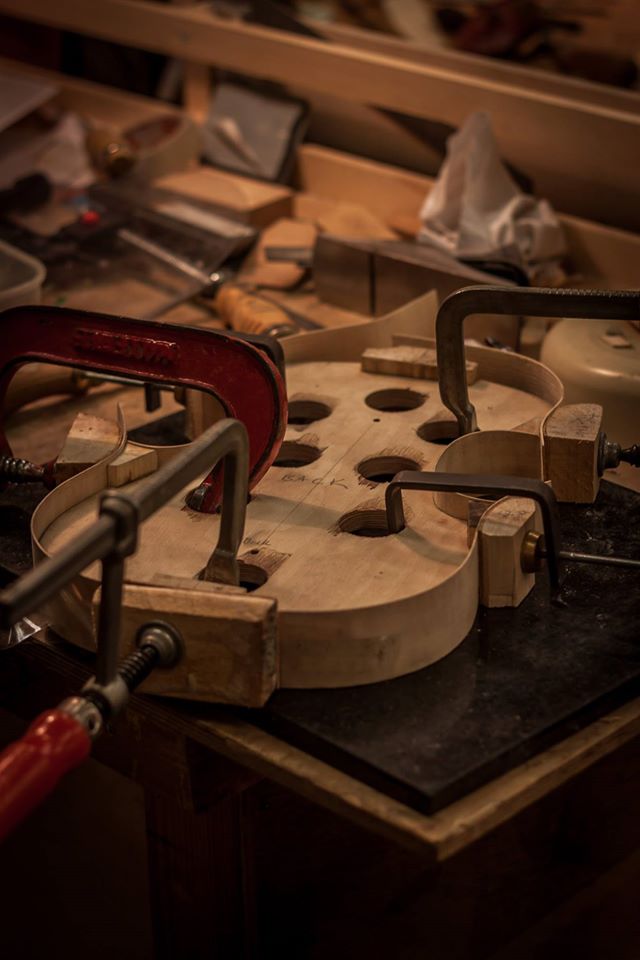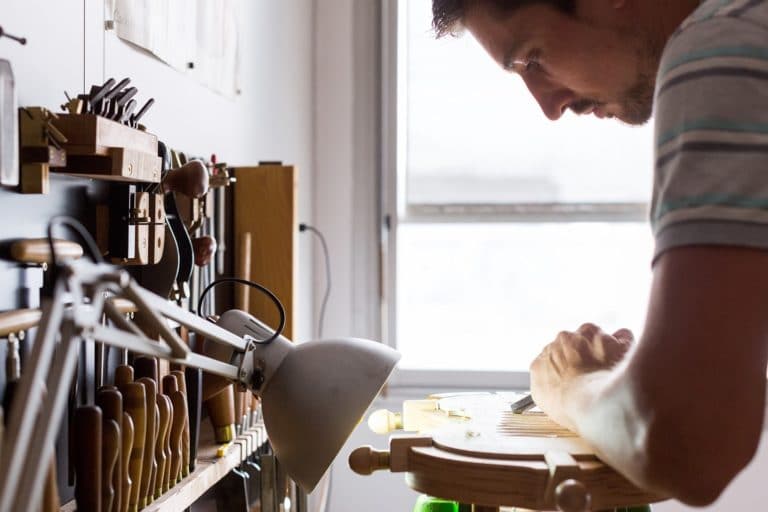I've been traveling to Beijing, the Chinese capital, for two years in a row now. If I choose to travel to the other side of the world, it's not for tourism, even though it's a total change of scenery. No, if I find myself writing this post about a "Luthier in Beijing", it's because I'm taking part in the Music Beijing show, and that's what I wanted to tell you about.

A Luthier in Beijing
China is a violin country, perhaps even the most important today. I've already talked about it in this article A violin maker in China and suggest you read it, as it deals with subjects in a fairly comprehensive way.
This is now the third year I've been to China, and the second in which I've attended the two major trade shows in Beijing and Shanghai. Each time, these experiences are as interesting as they are disconcerting, for a whole host of reasons.
Experiences from another world
Every country has its share of changes of scenery, but there are some where you feel it more, and for me, China is one of those. Everything is so different from our daily lives, from my daily life, that the shock is truly frontal. I'm not just talking about the tourist experience, but also from a business point of view.
In this photo, an experience I'd never imagined at the time: the queue to reach the Mutianyu section of the Great Wall. More than two hours of waiting to get through ticket control and onto the cable cars. Of course, with 35°C and the sun at its zenith.
But at least they'd turned on the outside air-conditioning...
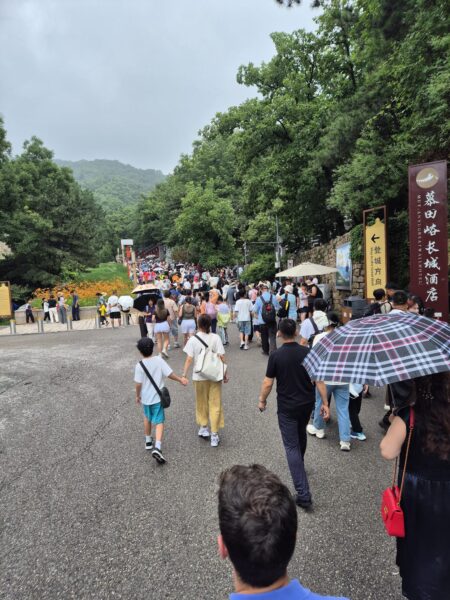
The human experience
First of all, relations between representatives of our species are quite different from what we know in France. And even within the same country, these differences are quite marked, notably between Shanghai(which is more Europeanized due to its history) and Beijing(more rooted in tradition).
Many of these perceptions can be uncomfortable, and may seem completely bewildering from our point of view. But the diversity of the world is an asset, and the surprises it provokes can also offer a certain form of satisfaction.
For example, there's this no-holds-barred attitude, which may surprise even the Chinese. They'll talk and act without a filter, and even offer 80% discounts on products, just to "test" them. This may seem shocking, but it's also a way of destabilizing the person in front of you. There are some really nice anecdotes about this.
Rules in China
What we hear a lot about in our homeland is just how repressive and freedom-less China is, where everyone is constantly monitored and tracked by cameras. Which is true up to a point, because in Shanghai, if you cross on red, a camera can detect it and you'll be fined at home a few weeks later. The same applies if you don't wear your seatbelt in the car...
But otherwise, there are a whole host of little things that should seem obvious to us, but don't necessarily seem to matter in China. Cigarettes in particular, although there seem to be plenty of signs and confiscation of lighters at the entrance to the show. It was possible to see many Chinese smoking in the hall. Even I, during the show, used an alcohol lamp to adjust the cambers with the musicians, and most of the security guards didn't even notice. Only one person came up to me to say that flames were forbidden.
Another surprising element is Beijing's traffic, with its many lanes, cars stalling in every direction and, above all, surrounded by bicycles, motorcycles and scooters. In fact, there are plenty of cycle lanes, but they're overrun by electric scooters, which arrive silently from behind and regularly threaten to collide with passers-by.
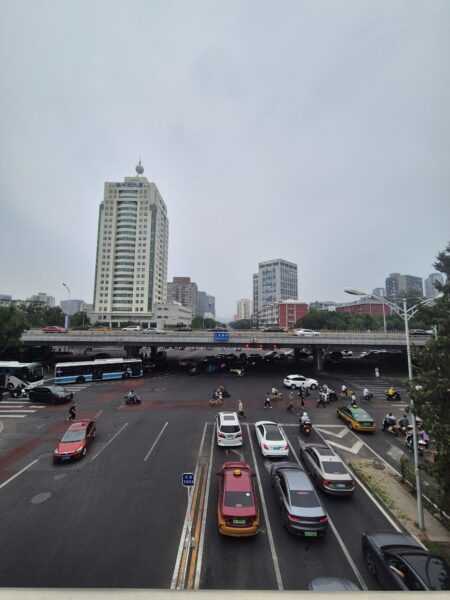
The two grandfathers
One day, before going through the main gate to validate the authorization to enter the show, I witnessed the following scene. Two grandfathers were blocking the queue by arguing with a guard. They wanted to get in, but didn't have a pass, so the guard refused to let them in. They were blocked by the turnstile anyway. The security representative told them all they had to do was get a ticket from the kiosk. It was just a little further on, and in any case it was free for senior citizens... But obstinate as they were, they protested that they had no desire to queue under the heat. Especially as it was to get a ticket which was free anyway. With great difficulty, they stepped over the turnstile and entered. The security guard hardly flinched, and didn't seem the least bit surprised.
I guess we're not always sticklers for the rules.
A hyper-connected world
Quite simply, without a phone, I don't know if it's possible to do anything in China. Literally, with two applications, Wechat and Alipay, you can do anything.
- Pay
- Getting paid
- Book a cab, train or plane
- Receive restaurant and hotel recommendations and discount coupons
- Connect with other people
Literally, it's used for everything, and everyone uses it all the time. That's why, as an exhibitor, I've had to adapt to these ways of working.
For example, offer to connect to stay in touch and communicate, or offer a QR code to pay directly with your phone. These are all details that require a great deal of preparation and implementation.
And all this is the result of being confronted with the realities of the field. But more on that later.
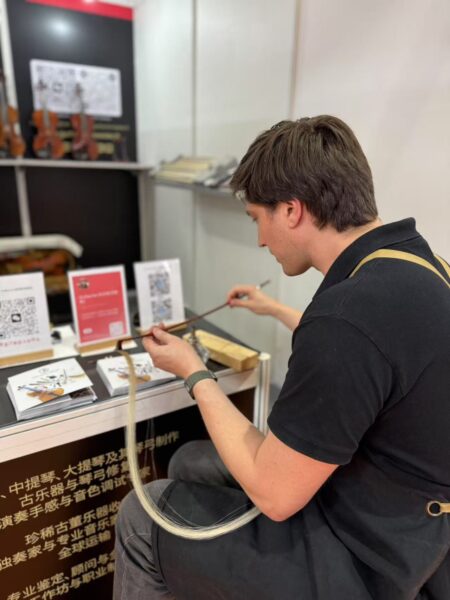
A luthier in Beijing - Le Salon
Organizing a trade show is always a big headache, unless some organization takes care of it for the exhibitors. This was the case at the Salons Internationaux du Patrimoine Culturel, where the CMA Grand-Est did an amazing job of showcasing all its craftsmen. On the other hand, this isn't really the case for us French exhibitors at the big music shows.
Last year in Shanghai, we were 3 companies in the French Pavilion, with no particular preparation or set-up. Opposite us, we had Italy, which, together with theITA(Italian Trade Agency - it's a bit like the Chambre des métiers et de l'artisanat in our country) had built and set up a huge stand featuring numerous craftsmen. The impact on the public was great, as is to be expected with such a presentation. Each artisan was provided with translators, negotiation areas, a coffee machine, coaching on payment methods and local customs, etc...
Organizing a luthier's showroom in Beijing
In short, as you may have gathered, for us it's every man for himself. At least until today. However, thanks to my new collaborator Leo, whom I almost poached from the ITA, I've been able to organize all the little intricacies of the show with a little more ease:
- Stand and furniture reservations.
- Stand dressing and product presentation
- Production and translation of brochures and posters, with printing on site.
- Negotiate with show organizers to obtain better prices.
On the other hand, there was also the merchandise organization:
- Creation of an ATA carnet.
- Packaging and travel of goods.
- Customs validation.
We were also assisted by a student from Beijing, Gabriela, who is a violinist in her university's orchestra, and who was able to help visitors with explanations of the instruments and, above all, with interpretation. Because even though I studied a little Chinese at university, it's impossible for me to hold a single conversation in this language.
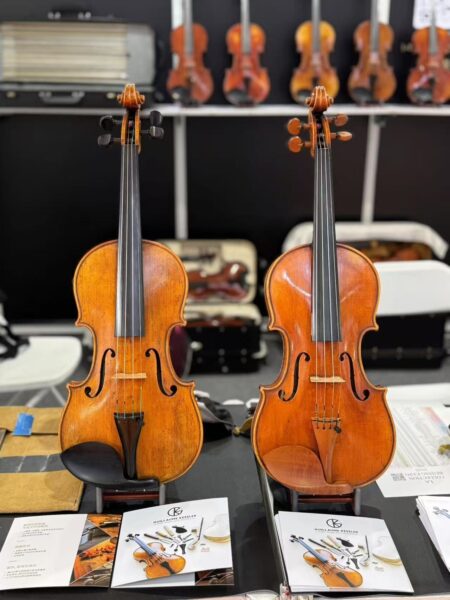
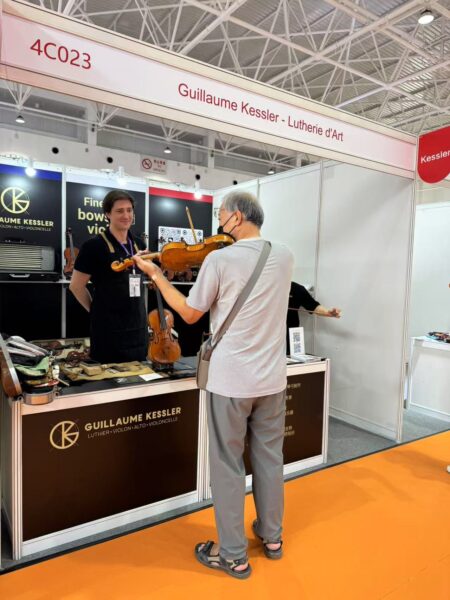
The show experience
For a luthier in Beijing to have an interesting experience, I sincerely advise doing this show. Of course, it may not be the only way to do business in China, and I'd go so far as to say it's not enough. However, it's an interesting starting point.
I understand that it's not at all easy to envisage such a move for small European companies. However, for the experience and adventure alone, it's definitely something to consider if you want to expand your market. Sure, it's complex, restrictive and even borderline incomprehensible, but it's also a place where the potential is great. In fact, it's incomparably greater than anything else you can imagine.
On the other hand, it's also a market that needs to be secured, educated and developed. For the know-how, abundance and diversity of lutherie is also beyond imagination.
Becoming a luthier in Beijing
Would you like to expand your workshop by selling your products in Beijing? Does this sound complicated, expensive and time-consuming?
Honestly, it's not that bad, and everything can be fully financed. So, even without cash, knowledge or a lot of time to think, nothing is impossible. It's even possible to take full advantage of music fairs with a few tips and a plan of action. In any case, I can help you and give you the benefit of my experience on the subject.
In that case, please contact me.

